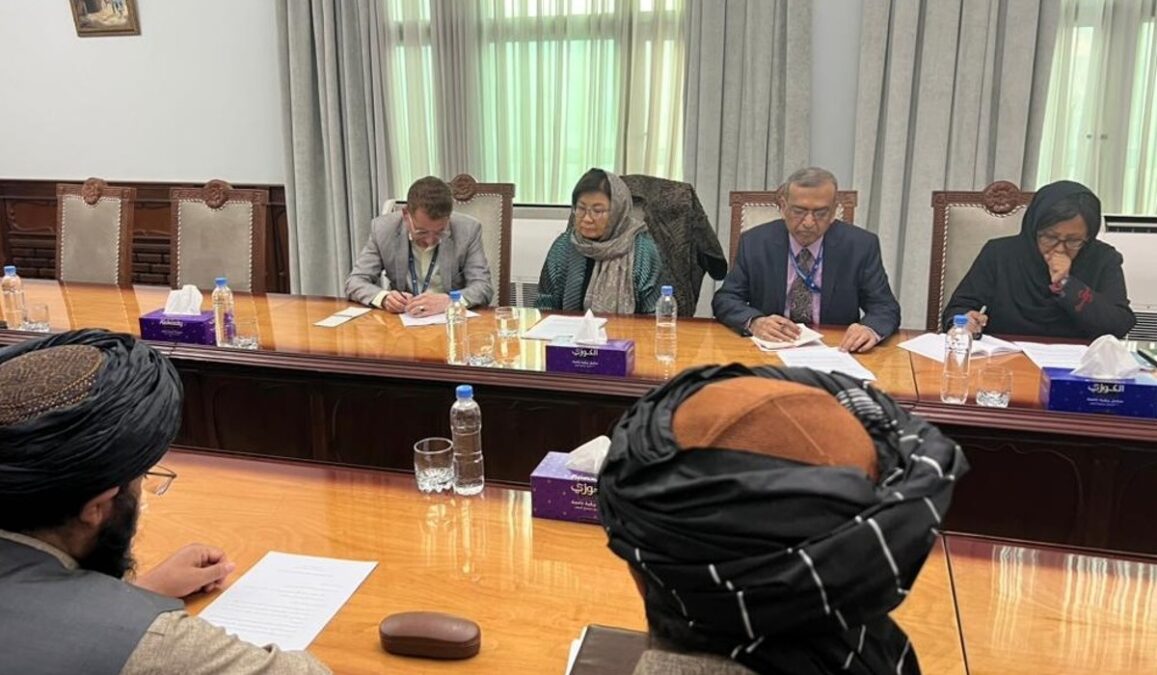As major non-governmental organizations (NGOs) suspend operations in Afghanistan, the United Nations Assistance Mission in Afghanistan (UNAMA) on Monday called on the Taliban to reverse its decision to ban women from working for NGOs.
“Millions of Afghans need humanitarian assistance and removing barriers is vital,” UNAMA said in a statement. According to UNAMA, the mission’s acting head and humanitarian coordinator Ramiz Alakbarov has met with the Taliban’s finance minister, Mohammad Hanif – who sent out the official letter ordering the ban.
The UN stated while the orders do not apply directly to the mission, many of its programs are carried out by NGOs subject to the order.
On Sunday, three global NGOs – Save the Children, Norwegian Refugee Council and CARE International – said in a joint statement that they were suspending their programs as they awaited clarity on the administration’s order.
“We cannot effectively reach children, women and men in desperate need in Afghanistan without our female staff,” the statement said, adding that, without women driving the effort, they would not have reached millions of Afghans in need since August last year.
Later Sunday, the International Rescue Committee (IRC) said in a statement that it was suspending its services in the country, citing similar reasons. IRC said it employs more than 8,000 people in Afghanistan, nearly 3,000 of whom are women.
Two other NGOs have also since stated they are suspending operations, they are AfghanAid and Islamic Relief – both are international organizations.
The International Committee of the Red Cross in Afghanistan also expressed concern at the move and warned of “catastrophic humanitarian consequences in the short to long term”.
Dozens of organizations work across remote areas of Afghanistan and many of their employees are women. It is these organizations that bring much-needed humanitarian aid to millions of poverty-stricken Afghans.
OIC says ban is ‘self-defeating’
The Organization of Islamic Cooperation meanwhile condemned the Taliban’s latest move and said in a series of tweets that “the fundamental rights of Afghan women have been dealt yet another severe blow following the order issued on 24 December 2022 by the de facto Ministry of Economy in Kabul to all national and international NGOs to suspend the jobs of female employees until further announcement.
“The OIC Secretary-General qualified the ban on women’s work for national and international NGOs as self-defeating and disserving the interests of Afghan people,” the OIC said.
The organization said it is “vigorously calling on the de facto authorities to revisit this decision for the sake of social inclusion of women and the undisrupted continuation of the much-needed international humanitarian safety net in Afghanistan.”
The UN Spokesperson for the Secretary-General Stéphane Dujarric meanwhile said on Monday that Antonio Guterres is “deeply disturbed by the reported order of the de facto Taliban authorities banning women from working for national and international non-governmental organizations.
“This decision will undermine the work of numerous organizations working across the country helping those most vulnerable, especially women and girls,” she said in a statement.
According to her, the UN and its partners, including national and international NGOs, are helping more than 28 million Afghans who depend on humanitarian aid to survive. “The effective delivery of humanitarian assistance requires full, safe and unhindered access for all aid workers, including women. The reported ban on women working with the international community to save lives and livelihoods in Afghanistan will cause further untold hardship on the people of Afghanistan,” she said.




